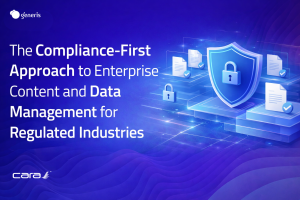11th August 2025 – California, USA – The City of Sacramento has selected the CARA Enterprise Platform from Generis as the foundation for its cloud-based document and data repository. Replacing a patchwork of legacy systems and disconnected silos, CARA will now serve as the single source of truth for official records across 17 municipal departments, from HR and finance to public works and city planning.
Previously operating on CARA version 3 with Documentum as the repository, Sacramento is now fully transitioning to the cloud-based CARA 5, eliminating Documentum in favour of a single, unified platform and central repository for managing all official documentation – ranging from permits and contracts to HR files, budget documents, and historical archives.
“CARA gives us a modern, cloud-native platform that transforms the way we manage and access documents, whether it’s sensitive HR records or public-facing information,” said Mrudul Sadanandan, IT Assistant Director, City of Sacramento. “Secure, anywhere access is critical to supporting our remote workforce and ensuring staff can perform their daily duties efficiently. This kind of modernization is essential to delivering transparent, reliable, and future-ready digital government services”
Sacramento’s shift to CARA Cloud is a key milestone in its broader digital transformation strategy—improving accessibility, compliance, automation, and long-term preservation of public records. With a vast volume of documents dating back to the 1880s, the City required a future-ready platform capable of supporting transparency, efficiency, and public access at scale. Ensuring that these records are easily accessible to the public is a key part of the City’s commitment to open government.
CARA replaces the City’s legacy back-end system with a modern interface and cloud-native infrastructure, streamlining document search, routing, and retention workflows. A key driver of the project’s success has been CARA’s ability to integrate with existing systems—including HR, finance, and digital signature platforms—to act as a central document repository. This eliminates content sprawl and enables consistent records management, retention, and archival practices across departments, while minimising disruption for users and IT alike.
“We’re excited about partnering with Generis to leverage CARA’s AI capabilities in a way that aligns with our vision for smart workforce,” said Mrudul. “From streamlining document discovery and automating classification to accelerating public records responses, CARA offers powerful tools that can make our processes more efficient and responsive. We’re especially looking forward to integrating CARA with our internal AI chatbot, enabling staff to access information through natural, conversational search. The platform’s ability to tie into GIS and accounts payable systems adds even more value to our long-term AI strategy.”
By standardising on CARA Cloud, the City of Sacramento simplifies document governance and builds a resilient information infrastructure for the next generation of public service.
About Generis
Generis is a UK-headquartered provider of world-class data, content and business process management for regulated industries globally of over 20 years. With the formalisation of the CARA Life Sciences Platform, and a new generation of customers and partners leveraging the CARA Enterprise Cloud Platform as a low-code enterprise platform for multiple verticals and use cases ranging from Financial Services, Government to Insurance and others, servicing clients including VISA, Ameritas, SAG, Fannie Mae, City of Sacramento, State of North Carolina and many others. More at generiscorp.com.
About City of Sacramento
The City of Sacramento is the capital of California and the county seat of Sacramento County. Sacramento’s government comprises numerous departments and offices—including Police, Fire, Public Works, Finance, Human Resources, Community Development, and Utilities—delivering essential services to more than 525,000 residents. The City actively focuses on diversity, equity, sustainability, and innovation, with ongoing efforts like homelessness response, climate action, and accessible community programming.

 Lifesciences
Lifesciences





